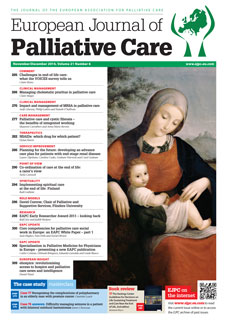The art of social work in palliative care: EAPC publishes new White Paper on core competencies
Dr Sean Hughes, Research Associate, International Observatory on End of Life Care, Lancaster University, Lancaster, UK, explains the background to a longer article published in the November/December issue of the ‘European Journal of Palliative Care’.
My work in more than 15 years as a palliative care social worker took
me into the homes and lives of numerous people and their families
facing illness and death. It was – for almost all of them – a time in
which everything was turned upside down; a time of crisis for many and a
life-changing experience for all.
The situations I found myself in varied hugely. Sometimes people were
near to death, alone and poorly supported, requiring urgent supportive
services within hours or days. Others had more time to organise their
affairs and to work on preparing for and adjusting to what lay ahead.
But what preparation had I received for this work and how was I
trained? In truth, there was little that I could refer to. My generic
social work training in the UK – while providing some focus on dealing
with loss, family dynamics, and crisis intervention – did not equip me
with the necessary knowledge and skills for working with dying people.
Much of my learning was acquired as I worked with little formal guidance
or instruction.
If this was true in the UK, what of the rest of Europe and beyond?
How is the palliative care social work task conceived and implemented
elsewhere? Do different models and practice approaches exist? What can
we learn from each other and how can we improve practice overall? These –
and other related questions – guided the work of the European
Association for Palliative Care (EAPC) Social Work Task Force as it set
out to develop a consensus document on the position of palliative care
social work in our European setting.
Core competencies for palliative care social work in Europe: an EAPC White Paper – part 1, outlines
the contexts of palliative care social work from a range of
perspectives and makes the case for a competencies approach. It argues
that social workers – with their focus on ‘mobilising the strengths and
resources of clients, their families and communities’ – are a key
component of the interprofessional palliative care team. Keen attention
to the psychosocial needs of people as they approach the end of life has
much historical precedence and remains an essential element of a truly
comprehensive palliative care service.
We hope this paper (and Part 2, published in early 2015) will provide
a basis for debate and a springboard for developing new core curricula
for palliative care social work training. This is essential if social
workers are to continue to contribute to improving the quality of life
of dying people and their families across Europe.
 To read a copy of the full article…
To read a copy of the full article…This post relates to a longer article, Core competencies for palliative care social work in Europe: an EAPC White Paper – part 1, by Sean Hughes, Pam Firth and David Oliviere, published in the European Journal of Palliative Care 2014 (21.6). You can download a free copy of the article from the EAPC website.
Readers with a web-based subscription to the European Journal of Palliative Care can download this issue plus
all articles in the journal archive. You can also browse the archive
and download articles by taking a 10-minute or 30-minute subscription.
Members of the EAPC receive discounted subscription rates to the journal
– click here to subscribe online.
Links
Read more about the EAPC Social Work Task Force: To examine the diversity of roles, tasks and education of palliative care social workers in Europe.
Read more about the EAPC Social Work Task Force: To examine the diversity of roles, tasks and education of palliative care social workers in Europe.
Coming up…
We shall be publishing a post on Core competencies for palliative care social work in Europe: an EAPC White Paper – part 2 early in 2015 when Pam Firth and David Oliviere will be contributing.
We shall be publishing a post on Core competencies for palliative care social work in Europe: an EAPC White Paper – part 2 early in 2015 when Pam Firth and David Oliviere will be contributing.

No comments:
Post a Comment